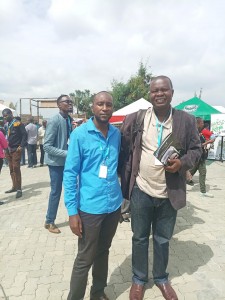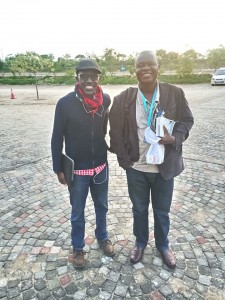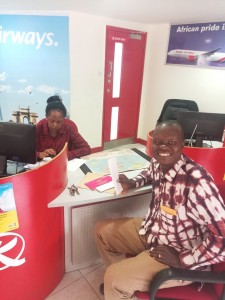Life inside the Fearless Summit in Nairobi – Kenya – Part 2
The interesting things i saw and heard-
 Bishop Titus Masika who is the founder of Christian Impact Mission shared about the impact of Christianity in the world today. He and his wife Agnes Masika made their presentations with a lot of energy. He has written a book called Mindset Change For Community Transformation which I bought and will read.
Bishop Titus Masika who is the founder of Christian Impact Mission shared about the impact of Christianity in the world today. He and his wife Agnes Masika made their presentations with a lot of energy. He has written a book called Mindset Change For Community Transformation which I bought and will read.
He left the comforts of Nairobi city and re-located to a remote area called Yatta where he started several poverty alleviation initiatives that have reported blessed the lives of so many people. We need to emulate his life by finding solutions to the problems that we and our people are facing.Leaders find solutions to problems,not excuses.
He urged that Churches need to fight the dependence syndrome by empowering the people. The answer for Africa’s problems lies within Africa, he said.
To make Africa first world, we need to have a mind-shift. Africans need to leave the box that we have put ourselves in. “Don’t just go for conferences and not take action on what you learn. Get out of the box! Take action,” he told the congregation.
At some moment he asked those who attended the conference last year and had taken some action to impact their lives and communities to stand up for recognition and also, so the angels can ‘take note’.
The bishop stated that a time has come when Christians “must grow” in all spheres.
“We have the capacity to change our families, communities, countries and to position Africa where it is supposed to be,”
Bishop Masika shared stories of how people from the UN, European Union, Israel government have all visited his village empowerment model and replicated it in other countries. I actually plan to visit his projects later this year.
Agriculture is one area that am very passionate about, and I strongly believe that unless if we Uganda start taking commercial farming seriously, this country may continue lagging behind in terms of economic development.
Bishop Masika is using Commercial farming as a vehicle to help himself and his people get out of extreme poverty.
It seems to be a desert in much of the Kenyan village of Yatta but that has not stopped these guys from using modern farming technologies to produce food in large quantities.
Now, God gave Uganda a big blessing in the form of fertile farm land with two planting seasons, very few other countries have this sort of rare blessing.
Uganda has a population of about 35 million people who have to eat everyday.So, in agricultural, we have ready markets, ready money waiting for us.
Now, with all the fertile soils and all the wealth below our soils, why do we Ugandans continue to import food and other stuff yet we can grow our fresh own food? Why do we continue buying imported goods without producing anything for export?
Any supermarket you enter in Jinja town and elsewhere in Uganda, almost everything sold is imported/made in China. So it seems like for every $200 a Ugandan earns, about $180 goes out of the country.
We are therefore not producing enough. If we produced little and lived a simple life that would be okay. But we don’t produce enough and yet want to live a comfortable life based on imported cars, TVs, Phones, clothes and electronics.
We now have a challenge of either taking advantage of our Rare Blessing (fertile lands) and engage in commercial farming or continue languishing in poverty and continue lamenting that Gavumenti etuyambe.
Ugandans who lived in the 1970s lived a simpler lifestyle. They owned fewer cars, TVs and so on than now. Today Ugandans lead a lifestyle we can’t afford. More cars, phones, TVs, motorcycles but export earnings still from coffee as it was in the ’60s. We consume much more than we produce, which is why our international trade balance grows worse every year. And the answer may most likely lie in increasing our agricultural productivity.
In the 1960s when Obote visited districts and towns, the residents of those towns brought him gifts at the rallies. Today MPs who earn over 20 million shs a month are at M7’s mercy for brown envelopes to pass his term limit and age limit bills. How could people riding bicycles in 1968 afford to buy the president gifts but todays MPs earning over 20 million a month in 2019 still need five million from M7? Answer: With our little production, but living a reckless/careless lifestyle today has made us a debtor nation and somehow reduced us to beggars.
I noticed that the Nairobi streets are wide and mostly named after their local leaders and pan-Africans. In Uganda, most of our streets and institutions are named after white colonial leaders. Streets like prince Charles Drive in Kampala, Queen Elizabeth national park,Rippon road,etc. In the 70s, former president Amin advised local governments to change and name streets after local people and pan-Africans. That’s how we came up with streets like Gabula road in Jinja named after the tribal chief of Kamuli district, Lubas road in Jinja named after the tribal chief of Mayuge people, Nasser road in Kampala (Named after Gamal Abdel Nasser Hussein who was the second President of Egypt and a pan-africanists), Lumumba avenue( named after Patrice Lumumba who was the first prime minister of the Republic of the Congo and also a pan-africanists) When Amin was deposed in late 70s, our leaders reverted street names back to old colonial names. I sometime fail to understand Ugandans fascination with white stuff. Why can’t we be proud of our own?
This was not our usual Ugandan Balookole conference where by some pastors just come on stage to boast of how they bought shoes from America and how if we also sow the ‘seed’, ‘wonders’ will happen to our lives as well. Of course there may be nothing wrong with telling people to give, provided people are told of the processes that lead to prosperity other than just speaking big, giving people new hopes and ambitions at the end of each year and leave them at that.
People need to be told that if they do nothing with their lives, nothing much will happen, as simple as that. God blesses us through work not big idle pronouncements.
After the end of the conference, I had to quickly head back to Uganda to continue with my engagements which I had temporally put off. Using a friend’s phone, I called a Taxify tax, a lady who was also heading to Uganda joined us. The guy drove us straight to the airport and on checking his meter, it said we pay KES 800, when I handed the guy my KES 1000 note, he claimed that when he stopped at the check point, the police had stolen his money and refused to give me back the change.And somehow the money that the police “stole” equaled the change he would have given me!! oh my..I didn’t want to urge with him, so I just laughed and let him go.
I checked in with my colleagues and boarded the JamboJet airline, a sister company of Kenya airways, a Bombardier type of aircraft, very small inside and with limited luxuries compared to the big airlines. This seems to be a budget airline for people who cannot afford the big airlines like KQ.Flying over the Kenyan and Ugandan skies,It could only go in the skies up to about 22,000 feet. I sat on the window side,would hear the funny noises,in some moments even thinking(may be falsely) that it could be a junk plane.
I used the opportunity of a window view to marvel at the wonders of this world and God’s creation.
Iam glad I attended the Summit, a lot was learnt and a lot needs to be put in practice. We all need to change our mindset, be agents of change and help our communities transform.
Bishop Masika quoted Acts 1:1- The former treatise have I made, O Theophilus, of all that Jesus began both to do and teach. Jesus Christ taught his people, but also engaged in real actions.We need to do likewise.
I believe the circumstances of our lives are largely dictated by our own decisions, our own behaviors and the choices that we make. The habit of blaming politicians, bosses at work, parents,colonialist, mentors, pastors, etc for our problems will most likely not help us.
We need to develop a mindset of self-reliance through Prayers, self-education, taking action and personal initiative so we can create the life we desire and not just act as mere victims of circumstances of life
Blessings- Edward

 Bishop Titus Masika who is the founder of Christian Impact Mission shared about the impact of Christianity in the world today. He and his wife Agnes Masika made their presentations with a lot of energy. He has written a book called Mindset Change For Community Transformation which I bought and will read.
Bishop Titus Masika who is the founder of Christian Impact Mission shared about the impact of Christianity in the world today. He and his wife Agnes Masika made their presentations with a lot of energy. He has written a book called Mindset Change For Community Transformation which I bought and will read. On early Wednesday morning of 5th June 2019 last week, I boarded a Kenya airways flight to Nairobi, Kenya to attend the Fearless Summit (
On early Wednesday morning of 5th June 2019 last week, I boarded a Kenya airways flight to Nairobi, Kenya to attend the Fearless Summit (
Recent Comments